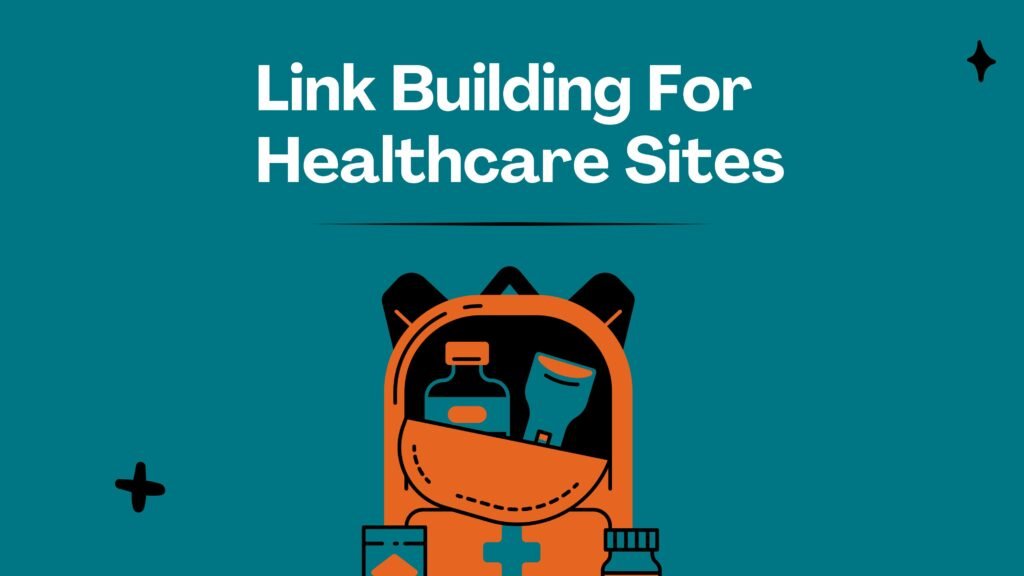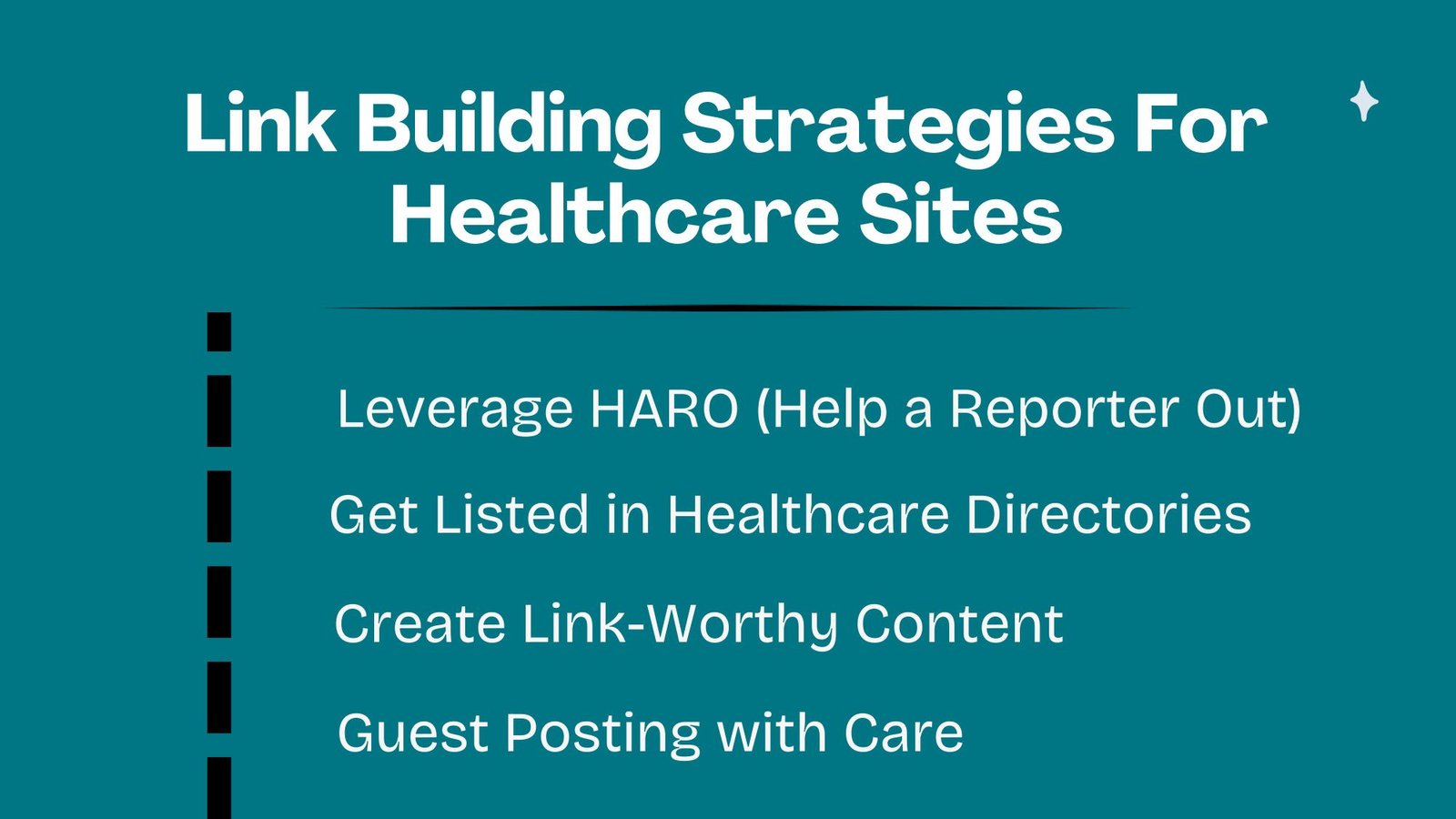
If you’re managing SEO for a healthcare website, you’ve probably realized that building backlinks in this niche is no walk in the park. Between strict regulations, Google’s ever-evolving algorithms, and the need to build trust with both users and search engines, link building for healthcare sites is both a challenge and an opportunity.
In this guide, I’m going to walk you through everything you need to know to create a powerful link-building strategy that actually works for healthcare websites in 2025. Whether you’re a digital marketing specialist, a clinic owner, or part of a hospital’s marketing team, this article is for you.
Let’s dive in.
Why Link Building Matters for Healthcare Websites
Link building is the process of getting other websites to link to yours. In Google’s eyes, each high-quality backlink acts like a vote of confidence. The more trustworthy sites that link to you, the more credible your site becomes. And for healthcare, where trust is everything, this is huge.
Backlinks:
- Improve your search engine rankings
- Drive referral traffic from trusted sources
- Build credibility and authority (key for EEAT)
Especially in the medical niche, Google holds websites to a higher standard. If you’re talking about people’s health, your site must show Experience, Expertise, Authoritativeness, and Trustworthiness (EEAT). And quality backlinks help prove all four.
The Unique Challenges of Healthcare Link Building
Before we talk strategy, let’s acknowledge the elephant in the room: healthcare is a tightly regulated industry. You can’t make wild claims, promote sketchy products, or use black-hat tactics to game the system.
Here are a few challenges healthcare websites face:
- YMYL Content: Google treats “Your Money or Your Life” topics (like health) with extra scrutiny.
- Limited Outreach Opportunities: Not every blog or site wants to link to medical topics.
- Heavy Competition: You’re often competing with well-established hospitals, government sites, and academic institutions.
But the good news? If you follow the right approach, you can build a solid link profile without risking penalties or losing trust.
Link Building Strategies For Healthcare Site
1. Create Link-Worthy Content
This is your foundation. Without high-quality content, no one will want to link to you—and even if they do, it won’t last.
Here are some types of content that work especially well in healthcare:
Educational Blog Posts
Break down complex medical topics into easy-to-understand guides. Think “What Is Type 2 Diabetes?” or “How to Deal With Seasonal Allergies.”
Research-Based Articles
People love citing studies and original research. If you can conduct surveys or gather your own data, even better.
Infographics
Visual content gets shared more often, especially on social media. Create infographics summarizing statistics or processes (like CPR steps).
Expert Interviews
Talk to doctors, specialists, or therapists and share their insights. This naturally brings credibility and links.
Pillar Pages
Create comprehensive resources around core topics like mental health, nutrition, or child care. These become go-to resources others want to reference.
Pro Tip: Make sure your content is reviewed by medical professionals and includes author bios that highlight credentials. This supports your EEAT score.
2. Build Relationships, Not Just Links
This is where most people go wrong. Link building isn’t about spamming emails—it’s about forming genuine connections.
Start by networking with:
- Health bloggers and influencers
- Wellness podcasters
- Journalists who write medical stories
- Healthcare communities and forums
Engage with their content. Leave meaningful comments. Share their posts. Over time, you’ll naturally find opportunities to contribute guest posts, offer quotes, or get mentioned.
3. Guest Posting with Care
Guest posting is still alive and well in 2025, but it must be done right. Especially in healthcare, relevance and accuracy matter more than ever.
Here’s how to approach it:
- Target only high-quality, relevant sites (avoid link farms)
- Pitch unique, valuable content ideas
- Always disclose medical credentials or authorship background
- Use natural, contextual anchor text when linking back
Guest posts on reputable health blogs, fitness magazines, or parenting websites can earn you top-tier backlinks.
4. Leverage HARO (Help a Reporter Out)
HARO is a goldmine for healthcare experts.
Here’s how it works:
- Sign up for HARO and choose your niche.
- You’ll get daily emails with media requests from journalists.
- Respond with insightful, expert quotes.
If selected, you get featured in an article with a backlink to your site.
I’ve personally seen clinics featured on Healthline and WebMD through HARO — and these are dream backlinks for medical SEOs.
5. Get Listed in Healthcare Directories
Local and niche directories are still important for healthcare websites, especially for local SEO. Think of them as your digital business card.
Make sure you’re listed (and consistent) in these:
- Google Business Profile
- WebMD directories (if eligible)
- Healthgrades
- Zocdoc
- Yelp (yes, even for doctors)
Also, explore local directories from hospitals, insurance partners, or associations like the American Medical Association (AMA).
6. Conduct Outreach for Resource Pages
Tons of universities, non-profits, and health organizations maintain resource pages.
Here’s a simple strategy:
- Find pages like: “Resources for Diabetes Patients” or “Top Mental Health Support Sites”
- Reach out via email
- Suggest your high-quality resource as an addition
Keep your email short, polite, and focused on how your content helps their audience.
Example email:
Hi [Name],
I came across your excellent resource page on [topic]. I recently created a comprehensive guide on [related topic], which has been reviewed by certified professionals. I think it could be a valuable addition for your readers.
Here’s the link: [URL]
Thanks for considering it!
Simple. Effective. And most importantly—ethical.
7. Use Testimonials to Earn Links
Ever used a health tech product, SaaS tool, or service you genuinely liked? Send them a testimonial. Companies often publish testimonials with a link back to your site.
This tactic is underrated but works surprisingly well.
Just make sure your review is authentic, specific, and includes your role/clinic for credibility.
8. Promote Content Through Social & Email
You can’t just publish a blog post and pray for links.
Promote your content across:
- LinkedIn (great for professional health topics)
- Facebook groups related to health or wellness
- Twitter (follow health journalists and public health accounts)
- Email newsletters to your patient base or peers
The more visibility your content gets, the more likely it is to attract backlinks organically.
9. Collaborate with Local Organizations
This works wonders for clinics, therapists, or small practices.
Host or sponsor:
- Health awareness events
- Webinars
- Free screenings or community checkups
Then request a backlink from the local news coverage or partner websites.
You gain links and community trust. Win-win.
10. Monitor & Analyze Your Backlink Profile
Finally, don’t forget to track your progress.
Use tools like:
- Ahrefs or SEMrush to see who’s linking to you
- Google Search Console to monitor impressions and click-throughs
- Majestic to analyze Trust Flow and Citation Flow
Keep an eye out for:
- Spammy backlinks (disavow if needed)
- Lost links (try to reclaim them)
- Your most linked pages (so you can
- create more like them!
Measuring and Analyzing Link Building Success
You can’t improve what you don’t measure—so tracking your link building efforts is crucial. It helps you identify what’s working, what’s wasting your time, and where to double down.
Here’s how you can measure success effectively:
Key Metrics to Track:
Number of Referring Domains: How many unique websites are linking to you? Quality > Quantity, always.
Domain Authority (DA) or Domain Rating (DR):
These scores (from Moz or Ahrefs) give you a rough idea of how powerful your backlinks are.
Traffic from Backlinks:
Are those backlinks actually sending referral traffic to your site?
Keyword Improvements:
Have your target keywords improved in rankings after getting backlinks?
Page Authority Growth:
Is the page you built links to gaining traction in the SERPs?
Link Quality:
Are you attracting links from authoritative, relevant sources—or just random blogs?
Tools to Use:
Ahrefs – for in-depth backlink analysis and tracking referring domains
SEMrush – for visibility reports and link audits
Google Search Console – to track impressions, clicks, and referring pages
Google Analytics – to measure referral traffic from backlinks
> Pro Tip: Create monthly or quarterly reports so you can see trends and adjust your strategy over time.
Common Mistakes to Avoid in Link Building for Online Courses
While this blog is about healthcare, many clinics and health professionals also offer online courses—from wellness workshops to telehealth certifications. If you’re building links to promote your course, watch out for these all-too-common pitfalls:
Mistakes to Avoid:
Linking from Irrelevant Sources
Backlinks from non-related niches (like automotive blogs) won’t help you. Stay relevant.
Overusing Exact Match Anchor Text
Too many identical keyword-rich links (e.g., “best online CPR course”) can trigger penalties. Use natural, varied phrasing.
Ignoring Link Quality
A hundred low-quality backlinks won’t beat one high-authority link from a health magazine or university.
Buying Links from Shady Networks
Google is getting smarter at detecting paid links. Stick to white-hat tactics.
Neglecting Internal Linking
If your backlinks point to one page, but users can’t navigate further, you’re losing potential conversions.
Not Aligning Content with Search Intent
Even if you get links, if the course content doesn’t meet the visitor’s expectations, they’ll bounce.
Remember, it’s not just about getting any backlinks—it’s about getting the right ones.
Summary: Key Link Building Tactics for Healthcare
Here’s a quick recap of the most effective strategies:
- Create valuable, trustworthy content
- Build relationships before asking for links
- Use HARO to get featured in major publications
- Guest post on relevant, high-quality sites
- Get listed in reputable healthcare directories
- Suggest your content for resource pages
- Offer testimonials to tools or platforms you trust
- Promote content actively via social and email
- Partner with local organizations for events and coverage
- Monitor your backlink profile regularly
Frequently Asked Questions (FAQs)
1. Is link building still important for healthcare websites in 2025?
Absolutely! In fact, it’s more important than ever. With Google’s emphasis on EEAT, high-quality backlinks from authoritative sources play a crucial role in improving visibility, trust, and rankings for healthcare websites.
2. How do I get backlinks without violating Google’s guidelines?
Stick to white-hat techniques like creating valuable content, guest posting on relevant sites, using HARO, and building relationships. Avoid link schemes, buying links, or spamming forums.
3. Can small clinics or local practices benefit from link building?
Definitely. Local link building—through directories, local partnerships, and community events—can dramatically improve local SEO and bring more patients through your doors.
4. Do backlinks help with local search visibility?
Yes. Local backlinks from directories, local news sites, and business partners help Google understand your geographic relevance, which boosts your rankings for local searches like “dentist near me” or “child therapist in Pune.”
5. How long does it take to see results from link building?
It varies. Some results (like traffic spikes from referral links) can be seen quickly, but SEO improvements often take 3–6 months or more, depending on your competition and existing domain authority.
6. What makes a good backlink in the healthcare niche?
A good backlink comes from a high-authority, relevant site—like a government health portal, reputable blog, university, or well-known publication. It should be natural, contextual, and ideally point to helpful content on your site.
7. How many backlinks do I need to rank?
There’s no magic number. Focus on building quality backlinks consistently rather than chasing high volume. One link from Healthline is far more valuable than ten from random blogs.
Final Thoughts
Link building for healthcare websites isn’t easy—but it is incredibly rewarding when done right. You’re not just building links; you’re building trust, authority, and visibility in a space where it matters most.
Start with one tactic at a time. Track your results. Refine your approach. And always put the patient (and reader) first.
Remember: in healthcare SEO, quality always beats quantity.

